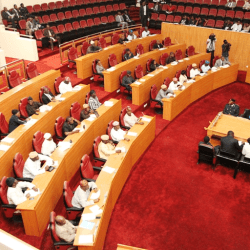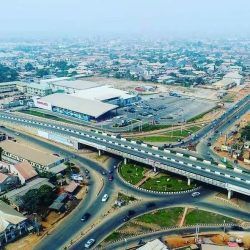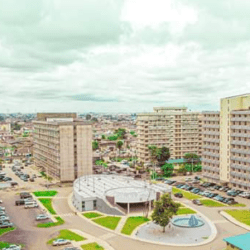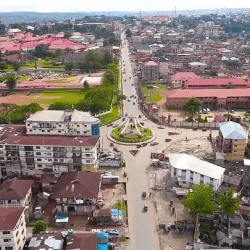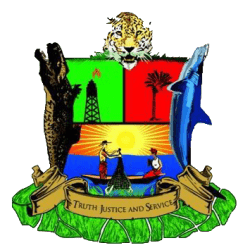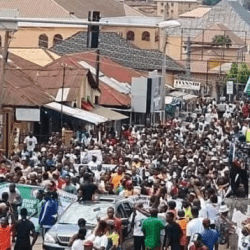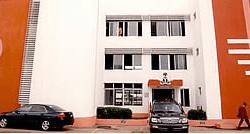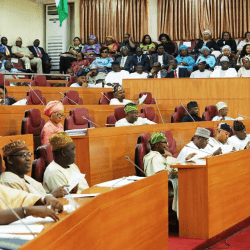Lagos State was created on the 27th May, 1967. From that date till 1st October, 1979, the State was governed by Military Governors/Administrators who combined both the Executive and Legislative functions of Government.

With the ushering in of the Second Republic on October 1st, 1979, Lagos State had its first taste of democracy and democratic governance.
The first Assembly in Lagos State was inaugurated by Alhaji Lateef Jakande on Tuesday, 2nd October, 1979 and Hon. Oladosu Osinowo, a legal practitioner representing Ikorodu Urban Constituency II was elected as the first Speaker of the House. The Clerk of the House then was Alhaji Bola Kotun.
The First Assembly had thirty six (36) Members all of whom belonged to the Unity Party of Nigeria (U.P.N). The House operated from the premises of Nos. 1-2, Oduduwa Street G.R.A. Ikeja until 1980.
Following the movement of the State Secretariat to Alausa, Ikeja, the House moved to its present site-the Assembly Complex, Alausa, Ikeja.
The First Assembly ran its full course of four years from 1979 to 1983.
The Second Assembly was inaugurated on October 2nd, 1983 with Hon. Oladimeji Longe, a lawyer, representing Itire-Ikate Constituency, elected as the Speaker.
Alhaji Bola Kotun remained the Clerk of the House. The Second Assembly also had thirty-six (36) members all of whom were members of the United Party of Nigeria (U.P.N).
The Assembly was however barely three months old when it was terminated prematurely by the Military Coup of December 31st, 1983.
From 1983, Lagos State like other parts of Nigeria had to endure nine years of Military rule before it could enjoy representative democracy again.
In January 1992, the Third Assembly was inaugurated and Hon. (Alhaji) Shakirudeen Abayomi Kinyomi, an engineer, representing Ojo Constituency was elected as the Speaker of that Assembly.
The Third Assembly had thirty (30) members, twenty-six were members of the Social Democratic Party (SDP) while four belonged to the National Republican Convention (NRC). The Clerk of the Assembly was Alhaji T. B. Tinubu.
The Third Assembly was also truncated by the Palace Coup of 17th November 1993 that ushered in Late Gen. Sani Abacha as Head of State. He subsequently announced the proscription of all democratic structures.
The Fourth Assembly was inaugurated on 2nd June, 1999 and had forty Honourable Members, thirty seven (37) were members of the Alliance for Democracy while three (3) belonged to the All People’s Party (APP).
The Rt. Non. Dr. Adeleke Olorunnimbe Mamora, a medical practitioner, now a Senator of the Federal Republic of Nigeria, Chairman, Senate Committee on Ethics then representing Kosofe 1 was elected as the Honourable Speaker.
The Permanent Secretary/Clerk of the House at the inauguration of this Assembly was Alhaji L. A. Gbadamosi (mni) who was succeeded in February 2001 by mr R. O. Jaiyesimi.
The present Assembly is the Fifth (5th) Assembly for Lagos State and was inaugurated on June 2nd 2003. RT Hon. Jokotola Pelumi, a Legal Practitioner, representing Epe Constituency II was elected at the inauguration of the House as the Honourable Speaker.
The House has forty (40) members. This number is made up of two (2) members from each local government area. Thirty Nine (39) of the members belong to the Alliance for Democracy (AD) while one is of the Peoples Democratic Party (PDP).
However, in the early period of the 5th Assembly precisely, Thursday 24th July, 2003 the House lost one of the re-elected members representing Amuwo Odofin Constituency II who was the Chief Whip of the Fourth Assembly, Hon. (Alhaji) Yusuff Amuda Buraimoh, aged 59 years.
Lagos
Lagos is the commercial capital of Nigeria and the most populated city in the country and Africa.
It was the administrative capital of Nigeria until December 1991 following the government’s decision to move the capital to Abuja in the centre of the country.

Lagos is a major African financial centre and is an economic hub.

The city has been described as the cultural, financial, and entertainment capital of Africa, and is a significant influence on commerce, entertainment, technology, education, politics, tourism, art, and fashion.

Lagos is also among the top ten of the world’s fastest-growing cities and urban areas.

The megacity has the fourth-highest GDP in Africa and houses one of the largest and busiest seaports on the continent.
The Lagos metropolitan area is a major educational and cultural centre in Sub Saharan Africa.

Lagos emerged as a home to the Awori tribe of the Yoruba of West Africa islands, which are contained in the present day Local Government Areas (LGAs) of Lagos Island, Eti-Osa, Amuwo-Odofin and Apapa.

Due to rapid urbanisation, the city expanded to the west of the lagoon to include areas in the present day Lagos Mainland, Ajeromi-Ifelodun, and Surulere.
This led to the classification of Lagos into two main areas: the Island, which was the original city of Lagos, and the Mainland, which it has since expanded into.
This city area was governed directly by the Federal Government through the Lagos City Council, until the creation of Lagos State in 1967, which led to the splitting of Lagos city into the present-day seven Local Government Areas (LGAs), and an addition of other towns (which now make up 13 LGAs) from the then Western Region to form the state.

The islands are separated by creeks, fringing the southwest mouth of Lagos Lagoon, while being protected from the Atlantic Ocean by barrier islands and long sand spits such as Bar Beach, which stretch up to 100 km east and west.

However, the state capital was later moved to Ikeja in 1976, and the federal capital moved to Abuja in 1991.

Even though Lagos is still widely referred to as a city, the present-day Lagos, also known as “Lagos Metropolitan Area” is an urban agglomeration or conurbation, consisting of 16 LGAs including Ikeja, the state capital of Lagos State.

This conurbation makes up 37% of Lagos State total land area, but houses about 85% of the state’s total population.

The business district of Lagos is home to Tinubu Square, named after the aristocratic slave trader Efunroye Tinubu. Lagos contains Murtala Muhammed International Airport, named after Nigerian president Murtala Muhammad, and is one of the busiest African airports. Lagos National Stadium has hosted various international sports events such as the 1980 African Cup of Nations.
